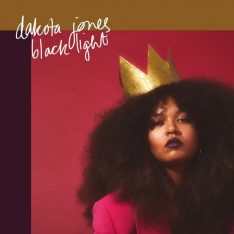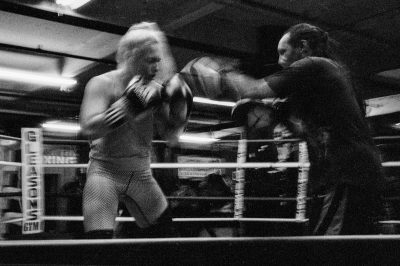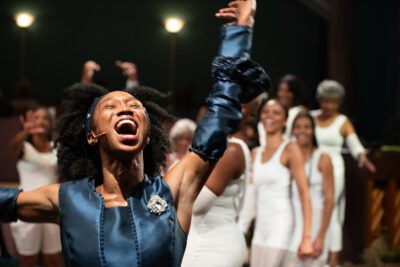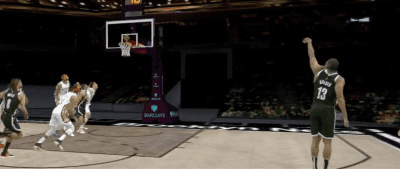Photo: Benjamin Stone Creative Services
On their first album, Dakota Jones brings funk, soul, rock and Black queer visibility
'I just want to make noise for all of us,' says singer Tristan Carter-Jones
In act one of Tristan Carter-Jones’ career, she was a playwright, but in act two, the Matawan, New Jersey-native has found herself doing something entirely different: fronting a band.
Carter-Jones grew up listening to a slew of powerful lead singers like Robert Plant, Janis Joplin and Chaka Khan—each fearless performers—but becoming the centerpiece of her own band, frankly, petrified her. “I was just terrified of singing in public for the longest time,” she told Brooklyn Magazine over coffee in Bed-Stuy, where she now lives.
In her college days at New York University, Carter-Jones would sing covers with friends who got together on occasion to jam, but it wasn’t until the group wound up writing an original song together that the switch flipped. “From that moment,” she said, “it was like ‘Oh shit, this is what we’re supposed to be doing.’”
That original begat more originals and those jam friends turned into Dakota Jones, a four-piece funk, soul and blues-rock band featuring Carter-Jones as lead vocalist, bassist Scott Kramp, drummer Steve Ross, and guitarist Randy Jacobs. They began playing regular live gigs around Brooklyn and Manhattan, releasing a few singles along the way.
Despite playing together for several years, Dakota Jones is only just releasing their debut full-length album, “Black Light,” on August 27. It features both entirely new material and previously released songs that have been, in Carter-Jones’ words, “zhuzhed” up. Recorded over the course of the pandemic, “Black Light” clearly incorporates parts of Carter-Jones’ influences—sexy rock from Robert Plant, unbridled passion from Janis Joplin, funky spunk from Chaka Khan.
And sure, there’s plenty to dance to on “Black Light,” but that doesn’t mean the LP is without vulnerability. Carter-Jones’ songwriting tenderly explores her own relationship with black heritage, femininity, and sexuality.
Brooklyn Magazine caught up with Carter-Jones to chat about ‘Black Light’, how her perspective as a queer Black woman guides her songwriting, and learning to lead.
This interview has been condensed for clarity and length.
 Considering you never planned to be a lead singer in a band, was being a frontwoman something you really had to work on getting used to?
Considering you never planned to be a lead singer in a band, was being a frontwoman something you really had to work on getting used to?
Totally. We booked our first show and it was just like, ‘Alright, here we go.’ And I felt like I was going to die the whole time, I was so scared and so nervous the whole time. And I still get really scared when we play a show, but it really only lasts through the first song and then I can kind of settle in, dissociate, and become that other person.
Dakota Jones has put out several singles and EPs in the last few years, but “Black Light” is your first full album. Was there something that finally prompted the band to do that?
We had been waiting for something to come along, like some genie to come along and be like, ‘Hey, we want you on our label and we need you to make this record.’ And you come to realize that no one is out here waiting for your projects, you have to kind of take hold of whatever it is that you want to do and go after it yourself.
The producer of the album actually reached out to us and loved our music. His name is John Wooler—he had been in the record industry for a really long time and started his own label and then retired, but heard our song [“Have Mercy”] in a movie called “Always Be My Maybe,” and reached out to us and came out of retirement to see where everything went. We kind of had a courtship. And eventually, our manager was like, ‘Do you want to produce their debut record? Is that what we’re doing here? Is that why we’re here?’ It was like a ‘I thought you’d never ask’ sort of thing.
It sounds like that was your genie moment after all.
In a sense. It looks different than how I had been anticipating it. But it definitely was totally a blessing that John found our music and ended up kind of falling in love with the band.
If you had to describe your band’s sound to someone who had never heard you before, how would you do that?
That’s always a hard question. I don’t feel like we fit in any specific box. But it’s part funk, part soul, part blues, a lot of sexiness. I think the main goal for me is always to make people feel something. I hear a lot of music on the radio these days that I don’t necessarily connect with and I feel like people around me have similar reactions. Your audience knows when it’s real and when it’s not, and when somebody is coming from an honest emotional place … I try to be blaringly honest with the things that I say and the things that I write about.
Some of the songs on ‘Black Light’ are revamped versions of songs you’ve already released, others are brand new. What sort of headspace were you in when you were writing the material for the record?
I feel like it’s easiest for me to write from a place of pain and heartbreak. That’s when I can most easily access my emotions. I wrote most of these songs during an immense heartbreak, it was like my first big heartbreak. That directly inspired a lot of the songs.
It’s heartbreak, but also self-medication and figuring out how to deal and how to find your way back to a joyful place after that heartbreak. I think you get a mix of joy and pain in this record.
A lot of musicians say that they can’t write a good song unless they’re hurting—is that true for you then?
For me, it has proven to be true thus far. I can’t sit down and say, ‘I’m going to write a song.’ I have to wait for something to strike me and things strike me most when I’m in agony, when I’m in some sort of pain over something.
My favorite on the record is “Down Slow.” It sounds like an Etta James song.
That song is the first love song that I wrote. It was the first time I was writing from a place of requited love. It’s about waiting for the other shoe to drop and feeling like you’re in this perfect thing, but it couldn’t possibly be this perfect and so if you’re gonna leave me, just do it gently. So even my love songs still have that twinge of ‘ready for the pain’ kind of thing. That’s one of my favorite songs on the album too, because I don’t give myself many opportunities to be that vulnerable or that quiet, especially when I’m singing. You want to, to a certain extent, show off sometimes, but this song just didn’t really call for that. I think it’s as honest as the record gets.
Do you have a favorite song on the album?
My very favorite song on the album is ‘We Playing Bad Games.’ It came together so seamlessly. It just sounded so big and sexy and full.
There’s a lot of sensuality and confidence, lyrically and musically, on this album, for example on “Like That.” Were you always that comfortable writing songs of that nature?
It’s just working the muscle. But also beyond the mechanics of that, I write for myself first. At a certain point, I stopped filtering myself, and stopped trying to write songs to sound like something else, or someone else. I don’t even know if it was necessarily a conscious choice, but I want to be honest with what I’m feeling and what I’m thinking in the hopes that somebody who’s gone through some of the same shit that I’ve been through can pick up on that and feel that. It was growing up … and kind of owning where I’m at, wherever that may be, even if that’s on the floor.
In terms of connecting with listeners, this album includes a number of songs that touch on your own personal experience of your life as a Black queer woman. What do you hope to achieve by highlighting that perspective?
I hope to be one of the faces at the forefront of representing for Black women and for queer women, and just people of color in general. There’s still people that come up to me after shows and are like, ‘Can I take a picture with you? Because I want my daughter to see that she can do this.’ Like little curly haired, brown girls that still don’t have enough examples of it. Especially the rock world is so male-dominant, and so straight male-dominant—there’s so many female rock stars in the world that aren’t where they should be at the moment. I just want to make noise for all of us.
What do you envision the future looking like for both yourself personally and Dakota Jones the band?
I want to tour the world … I want to meet as many people as possible and see the world through the music. This album, and the stories that we tell, the music that we make, has the potential to touch a lot of people.
Do you see yourself staying in New York?
[Laughs] Where am I gonna go? I feel like taking over New York is probably the hardest thing to do in the United States, so if we can just knock this out first.
You might also like 


























